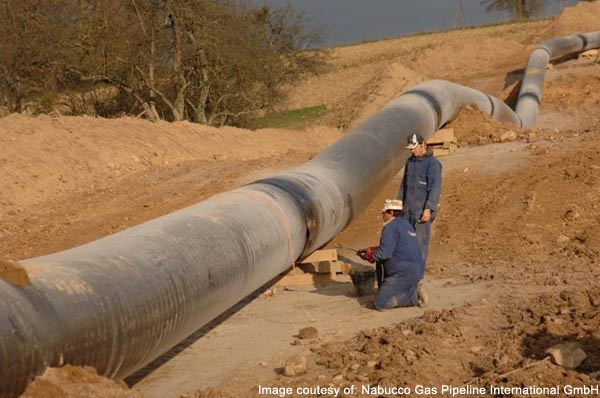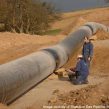
Cost And Supply Issues Delay The Nabucco Project
Publication: Eurasia Daily Monitor Volume: 8 Issue: 38
By:

The Nabucco pipeline consortium has discreetly postponed its final investment decision by another year, this time until early 2012, with construction to start in 2012 “at the earliest” (Dow Jones, February 18, 21). The investment decision had previously been postponed in October 2010 for 2011, targeting this year’s first or second quarter.
Gazprom’s counter-offers with its South Stream project, and its political allies in Europe, have only minimally and indirectly contributed to Nabucco’s latest postponement. The main reasons behind it include: a significant challenge to Nabucco’s official cost estimate, tardiness in accessing Turkmen gas, and unresolved competition between Nabucco and two other transportation projects over priority access to Azerbaijani gas.
On February 21, BP’s challenge to Nabucco’s official cost estimate became public via The Guardian, whether through a scoop or a leak. BP is the project operator at Azerbaijan’s Shah Deniz gas field, whose Phase Two of production is the designated source for Nabucco’s first stage. BP apparently evaluates the Nabucco pipeline’s construction costs at 14 billion Euros, a far cry from the Nabucco project management’s estimate of 7.9 billion Euros. BP and Nabucco’s Austrian-led management had intensely debated their conflicting estimates behind closed doors, in preparation for investment decisions and gas procurement tender. During those backstage debates, BP complained that the Nabucco management’s cost estimate was insufficiently substantiated.
Nabucco’s Viennese management dismisses BP’s estimate as “pure speculation,” and defends its own cost estimate citing feasibility studies. Meanwhile, the Nabucco management prepares a re-evaluation through the ongoing phase of detailed engineering work. Its 7.9 billion Euros figure dates back to May 2008 (at which point it surpassed the previous cost estimate by some 50 percent). For its part, BP cites the surge in steel prices since 2010 as a factor driving up the pipeline’s costs. According to BP, “the Shah Deniz Consortium is keen to work with the Nabucco and other pipeline groups to make sure that a viable pipeline brings Azerbaijani gas to Europe in the near future” (The Guardian, February 21; Trend Capital, February 23).
All this seems to position BP rather suddenly as a Nabucco-skeptic, with hints at other possible choices. A Nabucco cost increase of the magnitude suggested by BP would (if substantiated) render the Nabucco project unbankable and moot. By the same token it would transfer the advantage to Nabucco’s rival, the Interconnector Turkey-Greece-Italy (ITGI, led by Italian Edison), for access to Shah Deniz gas. If the price of steel becomes the main argument in assessing cost effectiveness, ITGI wins simply because it would use the existing Turkish pipelines (with some upgrades), rather than building its own pipeline through Anatolia as the Nabucco project would.
In addition to its originally planned trunkline, Nabucco needs a feeder line in southeastern Turkey for gas from Iraq’s Kurdish region. Building that 550 kilometer line would increase the Nabucco project’s overall costs. According to the Nabucco company’s chief executive, Reinhard Mitschek, leasing the existent Turkish pipelines along that route, instead of building a new line, would avoid that hefty cost increase. The company would only build its own feeder line from the Iraqi border to the Nabucco trunkline if a lease agreement cannot be reached with Turkey’s state pipeline operator Botas (Dow Jones, Bloomberg, February 21).
The European Commission has all along treated Nabucco as the strategic pipeline, and funding priority, within the Southern Corridor. Compared with Nabucco’s planned annual capacity of 31 billion cubic meters, ITGI’s 10 bcm targeting a cul-de-sac Italian destination is a non-strategic add-on. However, ITGI and yet another Italy-bound, 10 bcm project, the Trans-Adriatic Pipeline (TAP, driven by Norway’s Statoil), are each competing against Nabucco over priority access to Azerbaijani gas. The Shah Deniz consortium is preparing a tender to choose the buyer, or buyers, for the planned Phase Two of that field’s production.
The European Commission cannot officially take sides between the competing pipeline consortia, nor directly influence the choice to be made by the producers’ consortium. Moreover, given the possible upward revision of Nabucco’s project costs, the Commission now encourages the three rival pipeline projects to consider options for working with each other. According to Energy Commissioner Guenther Oettinger, the “European Commission would welcome any cooperation that contributes to achieving the objectives of the Southern Corridor.” The forms of such cooperation, however, remain unspecified, and far from being self-evident. The Nabucco consortium regards its project as a stand-alone project and does not discuss any kind of merger with another project (Financial Times Deutschland, February 18; EurActiv, February 19; Dow Jones, February 21).




